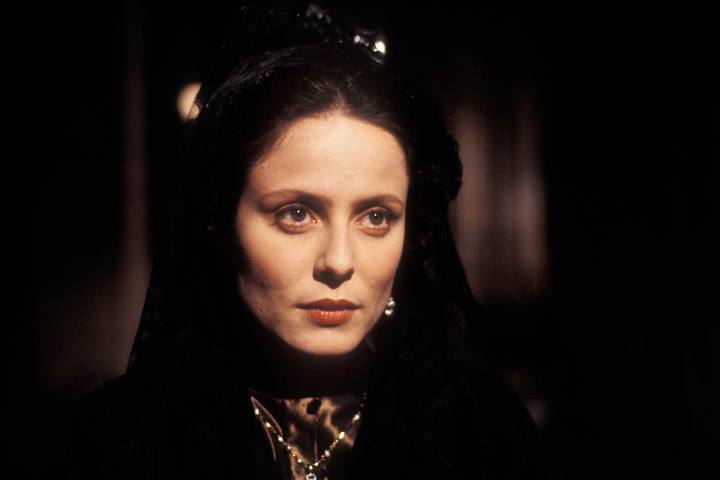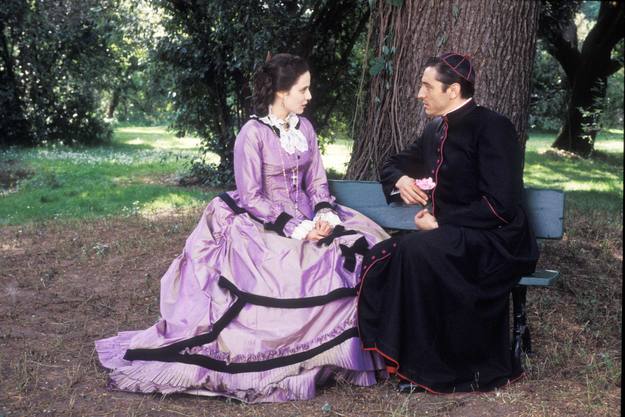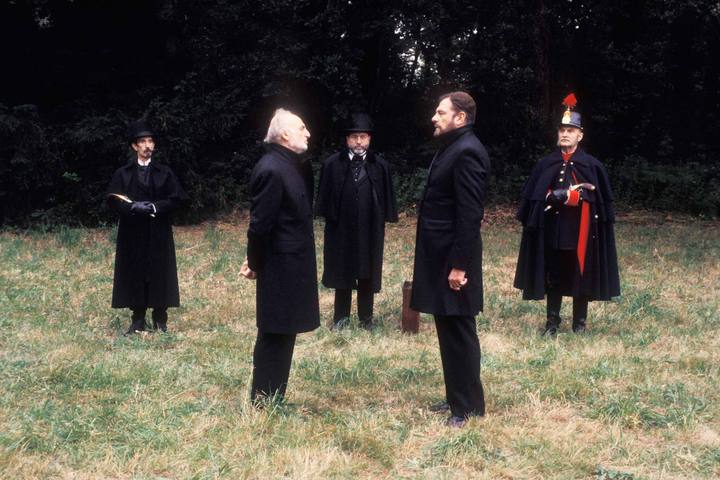
La Regenta: 1995 TV series, Spain
I continue with my erratic foreign movie posts for this year as well as posting on movies adapted from books. For more foreign movies, check out Caroline’s World Cinema Series 2012 and Richard’s monthly Foreign Film Festival round-up (first half of year and second half).

Aitana Sánchez-Gijón as Ana Ozores
Picture source
I’m always happy to post about a good adaptation from novel to screen and this one is a pretty good one. The IMDb.com page gives more detail on the cast and other details. As usual, I focus more on the differences between the novel and the adaptation rather than provide a full movie review. (If unfamiliar with the story, please see the posts on the novel.)
The TV series format works much better for a lengthy novel like La Regenta. There were two main concerns I had before watching the series:
- How will a screen adaptation show the rich inner world that Alas develops in the novel? Overall this was done fairly well. There were some additions in dialogue to help fill the backstory or allow the actors to provide inner thoughts without seeming forced or contrived. Unfortunately some of the characters still felt a little two-dimensional, reduced to foils of the main characters. On the whole, though, I thought they did an admirable job on this issue.
- How much would have to be cut or condensed in the adaptation? Even at 4 ½ hours in length, the series still had to make quite a few cuts to the novel. Certain characters weren’t developed, as mentioned above. The major characters fare well for the most part, although the depiction of Mesía, the least developed of the major characters in the novel, seems even more of a caricature. On the whole, though, I was impressed with how little of the central storyline was cut. The major shortfall is the reduction of time spent developing and showing the Vetustans. As has been pointed out in many other reviews of the novel, Vetusta is the main protagonist of Alas’ novel but at times the city and the secondary characters are shortchanged in order to cover the main storylines revolving around Ana.

Carmelo Gómez as Don Fermín de Pas with Ana
Picture source
There were other areas where the series excels, taking advantage of the different medium to highlight certain areas. Very little was changed for the canon Fermín de Pas, for example, but in seeing his vanity, quest for power, and cravenness before his mother he seemed even more of an oily character. In addition, minor changes help drive home a point about certain characters. Seeing the canon’s mother chomp on a cigar reinforces her tough-as-nails character. While Ana watches Don Juan Tenorio we see her on the stage with Mesía playing the central roles of the play (at times) instead of just reading about Ana’s feeling of being transported to the time of the play.
With almost no changes to his character from the novel I couldn’t help but wonder how Victor Quintanar became a judge, a question that didn’t occur during my reading of the novel because of the history provided. Only after he discovers his wife’s infidelity does the richness of his character shine through on the screen, becoming more than just an irritating clown at soirees. The novel had provided much more of his background and the extraordinary circumstances of his marriage to Ana, providing more depth to his character earlier than in the film. Another example where the novel was followed faithfully but still came across differently was seeing the importance of Petra, Ana’s maid, to many of the events and intrigues. Although Alas makes clear how central her role is in the novel, seeing her initiate or abet so much on the screen made it clearer for me–I don’t think it a stretch to call her one of the major characters. One thing the series didn’t attempt to replicate was the “free indirect style,” mentioned in my introductory post on the novel. While this reduces insight into the characters the series did a good job of filling in some of these blanks through other means (as noted above).
The scenery is gorgeous, providing a glimpse of what Alas saw since many of the settings are in Oviedo (Vetusta) and around Asturias. As one of the crew members mentions in one of the extra features, to prepare some of the locations all they had to do was cover the power lines. There is some nudity, which I don’t usually mention, but (speaking from experience) it may be an issue to people around you on a plane.
Highly recommended. The three episodes appear to be available online (without subtitles).

Víctor Quintanar (Héctor Alterio) and Álvaro Mesía (Juan Luis Galiardo)
Picture source